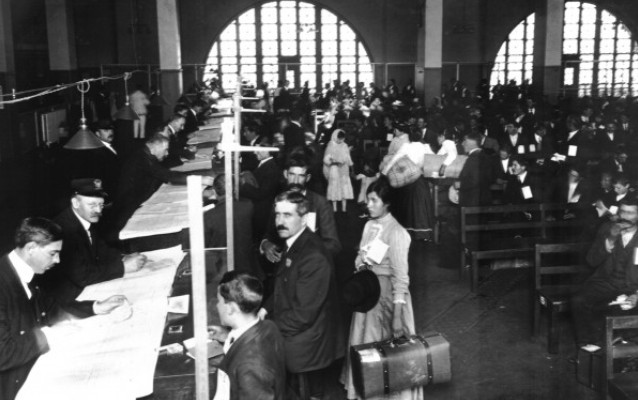Last updated: March 8, 2019
Lesson Plan
Checking In

- Grade Level:
- Upper Elementary: Third Grade through Fifth Grade
- Subject:
- Literacy and Language Arts,Social Studies
- Lesson Duration:
- 60 Minutes
Essential Question
What were some of the difficulties immigrants faced when processed at Ellis Island?
Objective
• Describe some of the difficulties immigrants faced when processed at Ellis Island.
• Identify with some of the hopes and reservations (feelings) of immigrants arriving to the United States.
• Discuss some of the reasons why the American government questioned immigrants to be granted entry.
Background
After arriving at Ellis Island, immigrants endured a medical inspection, then waited often hours nervously to begin a legal examination. The legal examination in the Registry Room represented the greatest challenge at Ellis Island. Immigrants needed to remember the information they had submitted weeks earlier to the clerk in the port where they began their trip. In this activity, students will play the role of immigrants being questioned by legal inspectors.
Manifest Record:
Before immigrants got on board, the shipping company clerks recorded information from passengers that will be verified when arriving at Ellis Island. This extensive survey asked immigrants a list of approximately thirty different questions, ranging from a person's birth and occupation, to whether the passengers declared themselves to be insane or anarchists. Immigrant officials at Ellis Island referred to the responses of the manifest records for verification, often speed-firing nine-to-ten questions in sixty-seconds. Based on the answers, immigrants will either be admitted or be detained (held) for further questioning.
View actual manifests at http://www.ellisisland.org/.
A blank manifest record, resembling one that immigrant officials used at Ellis Island is available as part of this lesson and on the "For Teachers" page on the Ellis Island website.
Preparation
- Pencils
- Paper
- Blank Manifest Record
Procedure
Note: This activity requires that "manifest information" (explained later) be taken before the field trip. Or if time and with enough supervision, ask students these questions on the boat. Answers need to be recorded on a "manifest chart" or similar sheet.
Head to the Great Hall, on the second floor, toward the wooden desks. Inform students that they will pretend to be immigrants about to be "checked in" to the United States. Pair students into groups of three-to-four and inform them that they will be a family waiting to be questioned. Explain that, during this "checking in" process, immigrants had to answer several questions before they were admitted to the country. Today, they will experience what it was like for immigrants.
Have students line up in two lines as they approach the wooden podiums. Using the already-completed "manifest chart," ask the student some of or all of the questions asked of them before (i.e.: "What do you want to be when you grow up?" or "what city do you live in?" See "manifest chart"). One line should be established for each inspector (teacher, chaperone, etc.) The questions can be interchangeable to perhaps reflect what is going on in current events or to topic currently discussed in class.
Explain that the students will have to answer the questions asked before the trip. The group will line up as a family, but will answer separately when it is their turn to be interrogated. Also, inform students that whoever provides a different answer to one written on the sheet will be sent to political detention (or in "pretend trouble").
After all students had their turn, the following questions should be asked and discussed:
- How did it feel to be processed at Ellis Island? How do you think the immigrants felt as they were standing on line?
- For those students detained, ask: What do you think it was like for passengers not allowed to immigrate to the United States?
- How hard/difficult was it to answer questions, even easy questions, under pressure?
- Now imagine that you and the inspector speak different languages! What problems might that cause? (Note: Luckily, interpreters/translators were there but it still would have been difficult to speak through an interpreter).
Vocabulary
Immigrant
Inspection
Legal Inspection
Inspector
